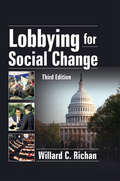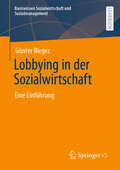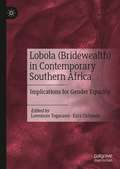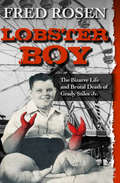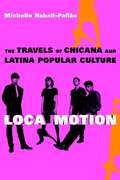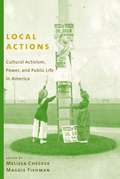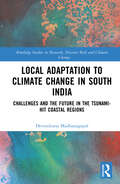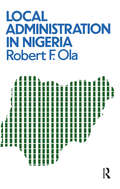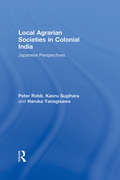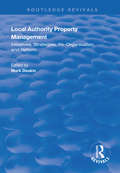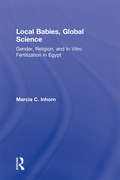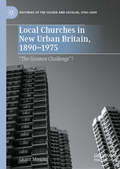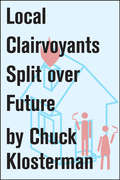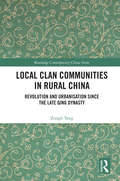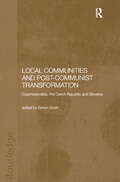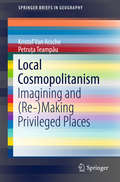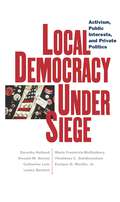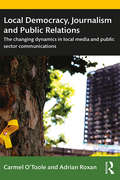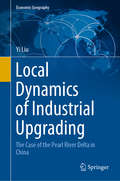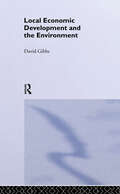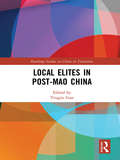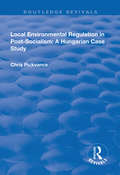- Table View
- List View
Loaded Words
by Marjorie GarberIn Loaded Words the inimitable literary and cultural critic Marjorie Garber invites readers to join her in a rigorous and exuberant exploration of language. What links the pieces included in this vibrant new collection is the author’s contention that all words are inescapably loaded—that is, highly charged, explosive, substantial, intoxicating, fruitful, and overbrimming—and that such loading is what makes language matter.Garber casts her keen eye on terms from knowledge, belief, madness, interruption, genius, and celebrity to humanities, general education, and academia. Included here are an array of stirring essays, from the title piece, with its demonstration of the importance of language to our thinking about the world; to the superb “Mad Lib,” on the concept of madness from Mad magazine to debates between Foucault and Derrida; to pieces on Shakespeare, “the most culturally loaded name of our time,” and the Renaissance.With its wide range of cultural references and engaging style coupled with fresh intellectual inquiry, Loaded Words will draw in and enchant scholars, students, and general readers alike.
Loafing Along Death Valley Trails: A Personal Narrative of People and Places
by William CaruthersIn 1926, on the advice of his doctor, former newspaperman William Caruthers, whose writings appeared in most Western magazines during a career spanning more than 25 years, retired to an orange grove near Ontario, California. Once there, he would go on to spend much of his time during the next 25 years in the Death Valley region, witnessing the transition of Death Valley from a prospector’s hunting ground to a mecca for winter tourists.This book, which was first published in 1951, is William Caruthers’ personal narrative of the old days in Death Valley—”of people and places in Panamint Valley, the Amargosa Desert and the big sink at the bottom of America.”A wonderful read.
Lobbying for Social Change
by Willard C. RichanThis step-by-step guide to lobbying covers it all-from the basics for beginners to specific techniques for experienced lobbyists"You and I may never achieve major public office, but we do not need to in order to affect public policy."-Author Willard C. RichanTo effect social change, any lobbyist&’s case must be presented with skill, knowledge, and confidence. This reader-friendly book shows the way. It assumes no prior knowledge of the subject and provides the nuts and bolts of public policy advocacy (lobbying) in non-technical language. Lobbying for Social Change, Third Edition is organized in a way that easily lends itself to use in the classroom as well as by individual or group advocates, and it is packed with clearly presented case material that illustrates the lobbying process in action. This new edition provides updated case material, expanded coverage of electronic media, and two new chapters; one focusing on direct action for fundamental change, and the other presenting a case history of a grassroots lobbying campaign.Part I of Lobbying for Social Change, Third Edition, entitled "The Basics," will show you how to: assess your political resources set an agenda for action understand whom to lobby-and how to gauge their power, motivation, and ability to effect or impede social change gather and use evidence to support your positionPart II, "Practical Applications," gives you nuts-and-bolts information about how lobbying is done. You&’ll learn: how to work directly with policymakers-face-to-face, by mail, by telephone, etc. effective rules for to testifying in a public hearing how to make use of the mass media-writing news releases, participating in panel discussions, what to do when being interviewed (and how to increase your chances of being a repeat guest on talk and news shows), and how to effectively work with print and electronic media, including the Internet ways to take on the system through direct actionPart III, "Case History of a Grassroots Lobbying Campaign," takes you inside an actual campaign (in this case, to amend the impending-at the time-welfare reform bill). You&’ll see how a group of five Philadelphia area social workers and one feminist activist started the Delaware County Coalition to Save Our Safety Net-a coalition that would make a substantial impact on the specifics of welfare in the state of Pennsylvania.This new edition of the classic manual for lobbyists is packed with vital information for lobbying in the new millennium. We urge you to consider making it a part of your personal or teaching collection today!
Lobbying in der Sozialwirtschaft: Eine Einführung (Basiswissen Sozialwirtschaft und Sozialmanagement)
by Günter RiegerDas Lehrbuch bietet eine umfassende, theoriebasierte und praxisnahe Einführung zum Lobbying der Sozialen Arbeit. Soziale Dienste, deren Handlungsbedingungen wesentlich politisch konstituiert sind, brauchen eine professionelle Interessenvertretung. Wer die Qualität Sozialer Arbeit verbessern will, muss auch ihre Politikfähigkeit steigern. Das Lehrbuch analysiert hierzu Grundfragen, Herausforderungen und Dilemmata des Soziallobbyings, erarbeitet Einflusschancen auf unterschiedlichen Ebenen der Politik, untersucht förderliche Bedingungen politischen Wandels und zeigt Wege und Instrumente einer gelingenderen Praxis des Soziallobbyings.
Lobola (Bridewealth) in Contemporary Southern Africa: Implications for Gender Equality
by Lovemore Togarasei Ezra ChitandoThis volume explores the multiple meanings and implications of lobola in Southern Africa. The payment of lobola (often controversially translated as ‘bridewealth’) is an entrenched practice in most societies in Southern Africa. Although having a long tradition, of late there have been voices questioning its relevance in contemporary times while others vehemently defend the practice. This book brings together a range of scholars from different academic disciplines, national contexts, institutions, genders, and ethnic backgrounds to debate the relevance of lobola in contemporary southern African communities for gender equality.
Lobotomy Nation: The History of Psychosurgery and Psychiatry in Denmark (Mental Health in Historical Perspective)
by Jesper Vaczy KraghThis book tells the story of one of medicine’s most (in)famous treatments: the neurosurgical operation commonly known as lobotomy. Invented by Portuguese neurologist Egas Moniz in 1935, lobotomy or psychosurgery became widely used in a number of countries, including Denmark, where the treatment had a major breakthrough. In fact, evidence suggests that more lobotomies were performed in Denmark than any other country. However, the reason behind this unofficial world record has not yet been fully understood. Lobotomy Nation traces the history of psychosurgery and its ties to other psychiatric treatments such as malaria fever therapy, Cardiazol shock and insulin coma therapy, but it also situates lobotomy within a broader context. The book argues that the rise and fall of lobotomy is not just a story about psychiatry, it is also about society, culture and interventions towards vulnerable groups in the 20th century.
Lobster Boy: The Bizarre Life and Brutal Death of Grady Stiles Jr.
by Fred RosenLobster Boy recounts the disturbing story behind the sensational life and murder of Grady Stiles, Jr., the legendary carnival "freak." His wife, Teresa, and family revealed years of physical and emotional abuse that made her arrange for her husband's murder. Rosen mixes in short vignettes about Stiles's equally unfortunate acquaintances, including The World's Only Living Half Girl, Midget Man, the Electrified Girl and the Human Blockhead. During Teresa Stiles's dramatic murder trial, Rosen becomes a character in his own book, risking his life in pursuit of the truth.
Loca Motion: The Travels of Chicana and Latina Popular Culture
by Michelle Habell-Pallan2006 Honorable Mention for MLA Prize in US Latina and Latino and Chicana and Chicano Literary and Cultural StudiesIn the summer of 1995, El Vez, the “Mexican Elvis,“along with his backup singers and band, The Lovely Elvettes and the Memphis Mariachis, served as master of ceremony for a ground-breaking show, “Diva L.A.: A Salute to L.A.’s Latinas in the Tanda Style.” The performances were remarkable not only for the talent displayed, but for their blend of linguistic, musical, and cultural traditions.In Loca Motion, Michelle Habell-Pallán argues that performances like Diva L.A. play a vital role in shaping and understanding contemporary transnational social dynamics. Chicano/a and Latino/a popular culture, including spoken word, performance art, comedy, theater, and punk music aesthetics, is central to developing cultural forms and identities that reach across and beyond the Americas, from Mexico City to Vancouver to Berlin. Drawing on the lives and work of a diverse group of artists,Habell-Pallán explores new perspectives that defy both traditional forms of Latino cultural nationalism and the expectations of U.S. culture. The result is a sophisticated rethinking of identity politics and an invaluable lens from which to view the complex dynamics of race, class, gender, and sexuality.
Local Actions: Cultural Activism, Power, and Public Life in America
by Maggie Fishman Melissa CheckerActivism is alive and well in the United States, according to Melissa Checker and Maggie Fishman. It exists on large and small scales and thrives in unexpected places. Finding activism in backyards, art classes, and urban areas branded as "ghettos," these anthropologists explore the many routes people take to work toward social change.Ten absorbing studies present activist groups across the country—from transgender activists in New York City, to South Asian teenagers in Silicon Valley, to evangelical Christians and Palestinian Americans. Each one examines a social change effort as it unfolds on the ground. Through their anthropological approach these portraits of American society suggest the inherent possibilities in identity-based organizing and offer crucial in-depth perspectives on such hotly debated topics as multiculturalism and the culture wars, the environment, racism, public education, Native American rights, and the Christian right. Moving far beyond the walls of academia, the contributors address the complex issues that arise when researchers have stakes in the subjects they study. Scholars can play multiple roles in the activist struggles they recount, and these essays illustrate how ethnographic research itself can become a tool for activism.
Local Adaptation to Climate Change in South India: Challenges and the Future in the Tsunami-hit Coastal Regions (Routledge Studies in Hazards, Disaster Risk and Climate Change)
by Devendraraj MadhanagopalThis book critically discusses the vulnerabilities and local adaptation actions of the traditional marine fishers of the tsunami-hit coastal regions of South India to climate change and risks, with an emphasis on their local institutions. Thereby, it offers a comprehensive account of the ways in which marine fishers live and respond to climate change. The Coromandel coastal regions of South India are known for their rich sociocultural history and enormous marine resources, as well as their long history of vulnerability to climate change and disasters, including the 2004 tsunami. By drawing cases from the tsunami-hit fishing villages of this coast, this book demonstrates that indigenous knowledge systems, climate change perceptions, sociocultural norms, and governance systems of the fishers influence and contest the local adaptation responses to climate change. By foregrounding the real picture of vulnerability and adaptation actions of marine fishers in the face of climate change and disasters, this book also challenges the conventional understanding of local institutions and fishers' knowledge systems. Underlining that adaptation to climate change is a sociopolitical process, this book explores the potentials, limits, and complexities of local adaptation actions of marine fishers of this coast and offers novel insights and climate change lessons gleaned from the field to other coasts of India and around the world. This book will be of great interest to students, scholars, and policymakers in climate change, fisheries, environmental sociology, environmental anthropology, sustainable livelihoods, and natural resource management.
Local Administration In Nigeria
by Robert O.F. OlaFirst published in 1984. This work is an attempt to look into the structure of local government and the working of local administration in Nigeria in four broad eras. The periods considered are the pre-colonial, the colonial, the self- governing and the military era.
Local Agrarian Societies in Colonial India: Japanese Perspectives
by Peter Robb Kaoru Sugihara Haruka YanagisawaThe first systematic attempt to introduce a full range of Japanese scholarship on the agrarian history of British India to the English-language reader. Suggests the fundamental importance of an Asian comparative perspective for the understanding of Indian history.
Local Authority Property Management: Initiatives, Strategies, Re-organisation and Reform (Routledge Revivals)
by Mark DeakinFirst published in 1999, this volume aimed to provide a signpost marking a significant development in the transition from estate to property management in local authorities. It examines the debate that has surfaced in the property profession since the Audit Commission’s (AC 1988a, b) reports on Local Authority Property Management (LAPM), and brings together sixteen studies from academics and practitioners with an interest in exchanging views, opinions and experiences on the development of LAPM. Its content, which links theory, method and techniques with practice, makes it a vital source of information for those with an interest in obtaining the most effective management of property.
Local Babies, Global Science: Gender, Religion and In Vitro Fertilization in Egypt
by Marcia C. InhornIn the late 1990s, Egypt experienced a boom period in in vitro fertilization (IVF) technology and now boasts more IVF clinics than neighboring Israel. In this book, Marcia Inhorn writes of her fieldwork among affluent, elite couples who sought in vitro fertilization in Egypt, a country which is not only at the forefront of IVF technology in the Middle East, but also a center of Islamic education in the region. Inhorn examines the gender, scientific, religious and cultural ramifications of the transfer of IVF technology from Euro-American points of origin to Egypt - showing how cultural ideas reshape the use of this technology and in turn, how the technology is reshaping cultural ideas in Egypt.
Local Churches in New Urban Britain, 1890-1975: “The Greatest Challenge”? (Histories of the Sacred and Secular, 1700–2000)
by Grant Masom“This monograph is an important contribution to our understanding of the varied fortunes of British Christianity during the twentieth century.” - Rev Dr Andrew Atherstone, Tutor in Church History and Latimer Research Fellow, Wycliffe Hall, University of Oxford, UK “This book is an important and original work. Anyone interested in twentieth-century Christianity in Britain will learn much from it. Grant Masom enables the reader to make sense of the new urban spaces that became a key part of British life in the last hundred years.” - Rev Dr David Goodhew, Visiting Fellow of St Johns College, Durham University, UK “This ground-breaking study adds new depth to our understanding of the importance of religion in English life and the role of the churches in shaping their own destiny in the first three-quarters of the twentieth century.” - Dr Mark Smith, Associate Professor in History, University of Oxford, UK This book contributes to the ongoing academic debates on secularisation—or the marginalisation of mainstream religious beliefs and practices—in twentieth-century British society. It addresses three areas in which the current literature is weak: the ‘agency’ of organised religion in the outcomes described as secularisation, rather than explanations based on external challenges (such as the ‘modernisation’ of society and thought, increased affluence, and more leisure choices); a focus on urban areas transformed by twentieth-century industrialisation and suburbanisation; and an extended time period to the end of the third quarter of the twentieth century, allowing proper consideration of long-term trends alongside short-term upheavals such as the World Wars, the Great Depression, and the social changes of the 1960s. Further, the book employs a distinctly different, highly data-driven approach, considers all religious movements, and sets its conclusions within the wider social and cultural context of a representative community.
Local Clairvoyants Split Over Future
by Chuck KlostermanOriginally collected in Chuck Klosterman IV and now available both as a stand-alone essay and in the ebook collection Chuck Klosterman on Living and Society, this essay is about psychics.
Local Clan Communities in Rural China: Revolution and Urbanisation since the Late Qing Dynasty (Routledge Contemporary China Series)
by Zongli TangUsing data collected in fieldwork and surveys, this book examines China’s clan system and local clan communities in rural Anhui, covering events in two periods: the imperial pattern as seen in the first half of the twentieth century and changes since 1949. Revealed by this research, during the late Qing and the Republic Era, a local clan in the investigated areas was run as a highly autonomous community with a strong religious focus, which challenges the corporate model raised by Maurice Freedman. Through examining single-surname villages, citang constructions, and updating of genealogies, local clans in Huadong, Huizhou and the lower Yangtze River plains in particular, developed earlier than those in the Pearl River Delta Region. Taking a cross-disciplinary viewpoint, this book analyses changes in local clan communities and clan culture as brought by the Chinese Revolution, Mao’s political campaigns, and Deng’s reforms. Starting with the late 1990s, a large migration from villages to cities has rapidly altered rural China. This geographic mobility would undermine the common residence that serves as part of a clan’s foundation. Under such situation, what transformations have taken place or will affect China’s clan system? Will the system continue to revitalise or die out? Local Clan Communities in Rural China reports these events/transformations and attempts to answer these questions. Placing a special emphasis on issues that have been overlooked by prior studies, this book brings to light many new facts and interpretations and provides a valuable reference to scholars in fields of sociology, anthropology, history, economics, cultural studies, urban studies, and population studies.
Local Communities and Post-Communist Transformation: Czechoslovakia, the Czech Republic and Slovakia (BASEES/Routledge Series on Russian and East European Studies #Vol. 3)
by Simon SmithPost-communist transformation in the former Soviet bloc has had a profound effect, not just in the political and economic sphere, but on all aspects of life. Although a great deal has been written about transformation, much of it has been about transformation viewed from the top, and little has been written about how things have changed for ordinary people at the local level. This book, based on extensive original research, examines the changes resulting from transformation at the local level in the form Czechoslovakia. It considers especially local democracy, social movements, and work collectives, and paints a picture of people gradually growing in self-confidence and taking more control of their communities, having lived for decades in a framework where so much was directed from the top.
Local Cosmopolitanism
by Kristof Van Assche Petruţa TeampăuThis book offers a unique perspective on cosmopolitanism, examining the ways it is constructed and reconstructed on the small scale in an ongoing process of matching the local with the global, a process entailing mutual transformation. Based on a wide range of literatures and a series of case studies, it analyzes the different versions and functions of cosmopolitanism and points to the need to critically re-examine current conceptions of globalization. The book first illustrates the interplay between networks and narratives in the construction of cosmopolitan communities in three specific cities: Trieste, Odessa and Tbilisi. Each has a past more cosmopolitan than the present and each uses that cosmopolitan past to guide them towards the future. Next, the book focuses on narrative dynamics by isolating several discourses on the cosmopolitan place and figure in European cultural history. It then goes on to detail the internal representations and local functions of larger wholes in smaller communities, shedding a new light on issues of inter- disciplinary interest: self- governance, participation, local knowledge, social memory, scale, planning and development. Of interest to political scientists, anthropologists, economists, geographers and philosophers, this book offers an insightful contribution to theories of globalization and global/ local interaction, bringing the local discursive mechanics into sharper focus and also emphasizing the semi- autonomous character of narrative constructions of self and community in a larger world.
Local Democracy Under Siege: Activism, Public Interests, and Private Politics
by Lesley Bartlett Catherine Lutz Dorothy Holland Marla Frederick-McGlathery2007 Society for the Anthropology of North America (SANA) Book AwardComplete List of Authors:Dorothy Holland, Donald M. Nonini, Catherine Lutz, Lesley Bartlett, Marla Frederick-McGlathery, Thaddeus C. Guldbrandsen, and Enrique G. Murillo, Jr.What is the state of democracy at the turn of the twenty-first century? To answer this question, seven scholars lived for a year in five North Carolina communities. They observed public meetings of all sorts, had informal and formal interviews with people, and listened as people conversed with each other at bus stops and barbershops, soccer games and workplaces. Their collaborative ethnography allows us to understand how diverse members of a community not just the elite think about and experience “politics” in ways that include much more than merely voting.This book illustrates how the social and economic changes of the last three decades have made some new routes to active democratic participation possible while making others more difficult. Local Democracy Under Siege suggests how we can account for the current limitations of U.S. democracy and how remedies can be created that ensure more meaningful participation by a greater range of people. Complete List of Authors (pictured) From Left to Right, bottom row: Enrique Murillo, Jr., Thaddeus Guldbrandsen, Marla Frederick-McGlathery. Top row: Dorothy Holland, Catherine Lutz, Lesley Bartlett, and Don Nonini.
Local Democracy, Journalism and Public Relations: The changing dynamics in local media and public sector communications
by Carmel O'Toole Adrian RoxanThis is a critical examination of the impact of sustained large-scale austerity cuts on local government communications in the UK. Budget constraints have left public sector media teams without the resources for robust citizen-facing communications. The "nose for news" has been downgraded and local journalists, once the champions of public interest coverage, are a force much diminished. The book asks, what is lost to local democracy as a result? And what does it mean when no one is holding the country’s public spenders to account? <P><P> The authors present extensive interviews with communications professionals working across different council authorities. These offer important insights into the challenges currently being faced by communicators within local public services. The book also includes in-depth case studies on the Grenfell Tower disaster, the Rotherham child-grooming scandal and the Sheffield tree-felling controversy. These events all raise serious questions about the scrutiny and accountability of local authorities and the important role the media can and does play. <P><P> Local Democracy, Journalism and Public Relations provides new empirical data on, and the real-world views of, working communications teams in local government today. For students and researchers interested in local journalism and public relations, the book illuminates the current relationship between these professions, local democracy and political accountability.
Local Dynamics of Industrial Upgrading: The Case of the Pearl River Delta in China (Economic Geography)
by Yi LiuThis book examines industrial upgrading in China’s Pearl River Delta (PRD), with a specific focus on how strategic coupling impacts industrial upgrading from the perspective of relational economic geography. It shows that firms in the PRD have been struggling after serving as low-tier suppliers and subcontractors for transnational corporations for two decades, since the 1980s opening reform in China. Indigenous innovation and direct state support have fostered the success of a few firms, but not the majority. In response, many local firms are now taking advantage of the opportunities to be found in global production networks, which link the PRD with the global economy. This book elaborates on how these opportunities are embedded and identified in global production networks with regard to different types of strategic coupling. It not only renews the theory of strategic coupling in economic geography, but also demonstrates potential strategies that latecomer firms can pursue, and which can have major implications for many developing countries and regions.
Local Economic Development and the Environment
by David GibbsThis book focuses upon the potential to integrate economic and environmental policies at the local and regional scale. Local initiatives are investigated within their wider economic and environmental policy contexts in order to illustrate both the constraints and opportunities for local policy makers. Attention is given to global economic trends, as well as to the specific policy contexts of the European Union and the national contexts of the UK, USA, Australia, Japan and Sweden. The key principles for designing integrative policies and descriptions of initiatives and projects in a variety of locations are also considered.
Local Elites in Post-Mao China (Routledge Studies on China in Transition)
by Yingjie GuoThis book provides fresh insights into the study of Chinese elites at the county level and below. By shifting the analytical focus onto the agency of elites at the local level and away from the institutional structures within which they operate, it fills a number of significant gaps in the field. In particular, this book addresses the lacunae through an empirically rich and diverse set of case studies. It proceeds from the premise that the study of local elites can be most fruitful through examining their relations with each other and with the groups that wield power in the community. Particularly pertinent to the analyses are three major relations, namely the relationship between the elites and their environment, between particular types of elites, and between the locality and the upper and lower scales. Ultimately, it concludes that these relations are not only essential to understanding local elites in post-Mao China but also in accounting for socio-political change and in distinguishing China from other types of societies. As a study of local elites in China, this book will be useful to students and scholars of Chinese politics, political sociology and Chinese Studies in general.
Local Environmental Regulation in Post-Socialism: A Hungarian Case Study
by Chris G. PickvanceThis title was first published in 2003. This text examines Hungarian local environmental regulation in practice rather than what should happen according to national legislation. The book is based on interviews with officials, regulators, firm managers and environmental groups in four localities in Hungary and on a national survey of local government officials. Numerous quotations from interviews are included. It is shown that the local social and economic context influences the behaviour of both local governments and regional environmental inspectorates. Firms' responsiveness to regulation is studied and it is shown that while some firms are ready to pay moderate environmental fines others are afraid of even symbolic fines. The findings are set within debates in the international literature on environmental regulation. It is shown that there are convergences with patterns reported in developed capitalist societies, but that certain legacies from state socialism are compatible with these patterns.


